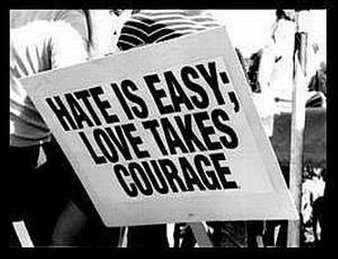For victory over a single sin, we give thanks and magnify the Lord of Hosts. What shall we say of the mighty conquest over all sin? A louder song, sweeter than has ever before reached high heaven, now rises clearer and nearer to the great heart of Christ; for the accuser is not there, and Love sends forth her primal and everlasting strain.  For victory over a single sin -- any inferior idea that would take us away from Life, Truth and Love? What a hopeful victory this is! And when we see even one such victory, it maps out the path for more. And when we see a victory over prejudice, well then, we are just opening the door to greater possibilities of freedom, cooperation and compassion. Prejudice always is about limitation and ignorance. Based on fear, it never lends itself to the higher order of intelligence, but generalizes into simplistic categories to a point where it becomes downright wrong. The relationship between prejudice and categorical thinking was first addressed by Gordon Allport (1954) in his classic book The Nature of Prejudice. Allport wrote that: “The human mind must think with the aid of categories....Once formed, categories are the basis for normal prejudgment. We cannot possibly avoid this process. Orderly living depends upon it. (p. 20)” But this is where all limitation and regression rush in. As it says in Science and Health (p. 144) "Ignorance, pride, or prejudice closes the door to whatever is not stereotyped." It follows then, if we are to progress individually and as a group or a nation, we need to challenge these categorical prejudices and replace them with a more universal and spiritual understanding of who we are in the world. This takes courage, and this takes love. Fortunately, we are made of both. There continues to be hopeful and progressive news on the human rights scene. As much as these have been forward steps for human rights, these steps are also victories over sin - over ignorance and prejudice. What is even more hopeful is that it demonstrates a thinking public willing to go deeper than stereotypes.
In each of these cases, there was controversy, but there was an insistence to go further than categorizing an issue as imminently evil and therefore only needing to be controlled, tolerated or forced to change. In each of these cases, there was a deliberate commitment to blast out of stereotypes that had been accepted for so long and re-think the issue from a higher standpoint. Jesus' instruction to love one another helps us break through the categorical stereotypes so easily attached to others. Prostitution is seen as reversible, instead of inevitable. Homosexuality is no longer equated with sensuality. Resentment is seen as temporary and fleeting, capable of being healed. Each higher idea makes way for new solutions, and lets stand a higher understanding of the very nature of man as spiritual, pure and innocent. In the New Testament, it reads, “There is neither Jew nor Greek, there is neither bond nor free, there is neither male nor female: for ye are all one in Christ Jesus.” (Galatians 3:28) There is no prejudice in oneness. There is no accuser standing outside of us, pointing the finger. There is no “outside." We are all one in Christ. This is radical. It is also true. Our unity with God and man gives us the expansive platform in which we can find peace and progress – infinite and immediate potential for good in all ways. Now that's worth a louder song!!
1 Comment
|
Kim C Korinek, CSBPhone: Translate here!
Archives
June 2018
banner photo (c) Micah Korinek; other photos by Gabe Korinek, Kim Korinek, Brad Crooks. Leslie Larsen (c) 2016
|
Services |
|

 RSS Feed
RSS Feed